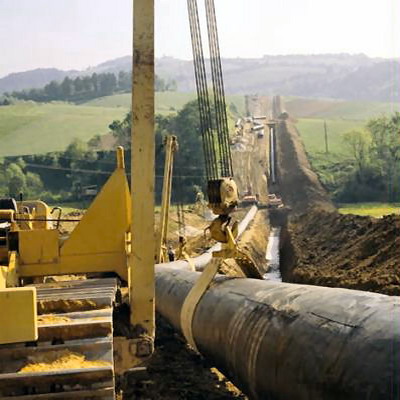
GAS DISCUSSIONS IN TURKMENISTAN, AZERBAIJAN AFTER THE BUDAPEST NABUCCO CONFERENCE
Publication: Eurasia Daily Monitor Volume: 4 Issue: 176
By:

European officials are hastening to Turkmenistan and Azerbaijan in the wake of the Budapest conference that relaunched the momentum of the Nabucco gas pipeline project (see EDM, September 19, 20). Turkmenistan’s central role as a gas supplier seems finally to be acknowledged with regard at least to phase two of the Nabucco project, if not sooner. Meanwhile, Azerbaijan remains key to kick-starting phase one of the Nabucco pipeline, which could start pumping gas by 2011-12 in correlation with phase two of field production at Shah-Deniz.
Great Britain’s energy minister, Malcolm Wicks, conferred with the presidents of Turkmenistan and Azerbaijan, Gurbanguly Berdimukhamedov and Ilham Aliyev, on September 20-21 in Ashgabat and Baku, respectively.
Wicks’ visit to Turkmenistan was billed as the first British ministerial-level visit there in nine years. Such a hiatus reflected the policy vacuum in Europe during all those years. Now, the prospect of hanging on Russia’s pipelines seems to concentrate European minds at last. Wicks followed in the footsteps of a BP delegation that conferred with Berdimukhamedov earlier this month. BP is the main partner (alongside Norway’s Statoil and Azerbaijan’s State Oil Company) in the Shah-Deniz gas-extraction project and the Baku-Tbilisi-Erzurum pipeline.
Wicks and Berdimukhamedov discussed the proposed trans-Caspian gas pipeline from Turkmenistan to Azerbaijan. The Turkmen gas would then be piped along the Baku-Tbilisi-Erzurum route and from there into the Nabucco pipeline to Central Europe. Berdimukhamedov seemed more amenable to this western option than at any point since he came to power nine months ago. However, he also dwelt on the southern option that would bring Turkmen gas via Iran to eastern Turkey for the planned Nabucco pipeline.
Berdimukhamedov encouraged British companies to explore and develop offshore oil and gas fields in the Turkmen part of the Caspian Sea. While Ashgabat has traditionally preferred small British firms, with correspondingly meager results, Wicks underscored BP’s incomparably larger potential, suggested setting up an offshore drilling company, and supported BP’s proposals to bring that company’s capabilities to Turkmenistan. Talks were also held with the Turkmengaz state company and the Oil and Gas Ministry. The British minister spoke for the European Union in saying that the proposed “trans-Caspian pipeline is of special importance” and the “EU intends to mobilize their financial resources to implement this project.”
Significantly, Turkmen official media reports mentioned specifically the trans-Caspian pipeline option and quoted Wicks` remarks about its mutually beneficial nature. Previously, Turkmen media coverage of such visits had stopped short of doing so.
In Baku, President Ilham Aliyev and other officials reaffirmed Azerbaijan’s staunch commitment to the Nabucco and trans-Caspian projects. Meanwhile, Azerbaijan’s State Oil Company, which plans to become a major gas producer, proposes joining the Nabucco consortium. The consortium includes (since 2004) the pipeline companies of five countries along the route, each holding a 20% stake in the project. But it does not yet include a major gas producing company. Azerbaijan’s state company as well as Gaz de France is willing to fill that niche.
A big producer’s accession to the consortium would help to hold down the growth of investment costs. In Azerbaijan’s case, it can contribute not only Shah-Deniz production, but also the future gas output it expects from the deep-water Guneshli and nearby offshore fields, where large gas deposits are proven to exist beneath the known oil deposits.
Austrian Economics Minister Martin Bartenstein — whose OMV company initiated and indirectly leads the Nabucco consortium — also went to Turkmenistan and Azerbaijan in the immediate wake of the Budapest conference. He conferred with Berdimukhamedov on gas supplies for the Nabucco pipeline and invited the Turkmen president to Austria.
In Baku, Bartenstein and Industry and Energy Minister Natig Aliyev signed a memorandum of understanding on procurement of gas supplies from Azerbaijan and the integration of those gas volumes into the Nabucco pipeline through the Baku-Tbilisi-Erzurum route. OMV and Azerbaijan’s state oil company are to discuss the details of the procurement and transport of gas from Azerbaijan to Baumgarten, the Nabucco project’s terminus and distribution center near Vienna.
This development suggests that OMV and the Austrian government (part-owner of OMV) are not wedded to their agreement of intent with Gazprom regarding gas procurement and the use of Baumgarten (see EDM, May 27, 29, 31) and that they can be weaned off that temptation, provided that access to non-Russian gas opens up. However, OMV must cease undermining the Nabucco consortium through hostile-takeover maneuvers against the consortium partner, Hungary’s MOL — maneuvers that OMV has continued almost overtly in the wake of the Budapest conference on Nabucco.
Meanwhile in Duesseldorf, the RWE company confirmed its offer to join the Nabucco consortium as an investor, as it had announced at the Budapest conference. RWE is Germany’s second-largest company (after E.ON) in terms of gas trading, transport, and storage, serving gas-fired power plants and municipal utilities. Its intention to join Nabucco is contingent on access to commercially attractive gas volumes.
To open such access, Turkmenistan and Kazakhstan need to be convinced of Western resolve. Wicks’ remarks as quoted during his visit indicated such resolve. Concerning Russia’s opposition to a trans-Caspian pipeline, Wicks told Baku media, “The right to decide on this matter is Turkmenistan’s and Azerbaijan’s and nobody else’s. Oil and gas issues are not just energy issues; they are national security issues for many countries. The EU’s cooperation with countries in the [Caspian] region should be seen through the prism of the energy security and national security of all states involved in these projects.”
(Neytralny Turkmenistan, Altyn Asyr, ANS, Azartaj, Turan, Platts Comodity News, Financial Times Deutschland, September 20-22)




